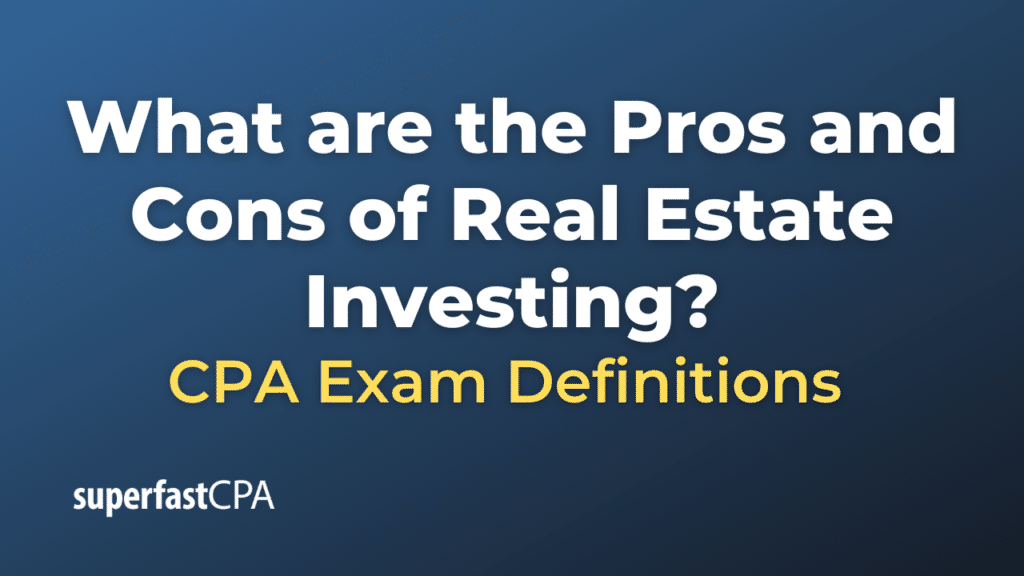Pros and Cons of Real Estate Investing
Real estate investing involves the purchase, ownership, management, rental, or sale of real estate for profit. Like any investment strategy, it has its own set of pros and cons.
Pros of Real Estate Investing
- Cash Flow: Rental properties can provide a steady, reliable income stream.
- Appreciation: Over the long term, real estate values generally rise, providing capital gains.
- Tax Benefits: Real estate investors can take advantage of numerous tax benefits, such as depreciation deductions and the ability to defer capital gains through techniques like a 1031 exchange.
- Diversification: Real estate can add diversification to an investment portfolio, helping to spread risk.
- Inflation Hedge: Real estate can act as a hedge against inflation. As living costs increase, so too can rental income and property values.
- Control: Unlike investing in stocks or mutual funds, real estate is a tangible asset that you can control directly.
Cons of Real Estate Investing
- Illiquidity: Real estate is not a liquid asset. It can take time to sell a property, and in the meantime, you’re responsible for ongoing costs.
- Costs and Responsibilities: Owning real estate comes with substantial responsibilities and costs, including maintenance, insurance, property taxes, and possibly property management fees.
- Market Risk: While real estate generally appreciates over the long term, it can also go through periods of decline.
- Location Dependency: The success of a real estate investment can be heavily dependent on location. Factors like job growth, neighborhood quality, and local regulations can significantly impact property values and rental income.
- Financial Risk: If you use leverage to purchase real estate, this increases financial risk. If you can’t cover your mortgage payments, you could lose your property.
- Barriers to Entry: Real estate investing often requires significant upfront capital, making it less accessible to some investors.
Like any investment strategy, real estate investing requires careful consideration of these pros and cons, as well as thorough research and potentially advice from professionals like real estate brokers or financial advisors.
Example of the Pros and Cons of Real Estate Investing
Let’s look at an example of real estate investing.
Scenario: Real Estate Investing
John, an investor, purchases a residential property for $250,000 in a steadily growing neighborhood with a down payment of $50,000. He takes a mortgage for the remaining amount. He rents out the property for $1,500 per month.
Pros:
- Cash Flow: After paying his monthly mortgage payment, property taxes, and maintenance expenses, John is left with a net income of $500 per month, providing a steady cash flow.
- Appreciation: Over a period of 10 years, due to development in the neighborhood and overall market growth, the value of the property increases to $350,000. If John decides to sell, he stands to make a significant profit.
- Tax Benefits: John is able to deduct property taxes, mortgage interest, insurance, and depreciation from his taxable income, thereby reducing his overall tax liability.
- Inflation Hedge: As inflation rises, so too does the rent John charges his tenants, preserving his purchasing power.
Cons:
- Illiquidity: If John needs to access the equity in his property quickly, he may have difficulty selling the property right away. Real estate sales can often take weeks or even months to complete.
- costs and Responsibilities: John is responsible for maintaining the property, which includes the cost of repairs, improvements, and potential property management fees if he decides to hire a property manager.
- Market Risk: If the real estate market takes a downturn or the neighborhood declines, the value of John’s property could decrease, possibly below the amount he paid.
- Financial Risk: If for some reason John can’t find a tenant for an extended period, or his tenants can’t pay their rent, he’s still responsible for his monthly mortgage payment and other costs. This risk is amplified because he used leverage (debt) to purchase the property.
This example demonstrates some of the potential benefits and risks associated with real estate investing. It’s important to note that every situation is unique, and potential real estate investors should carefully consider their own financial situations, risk tolerance, and market conditions.













